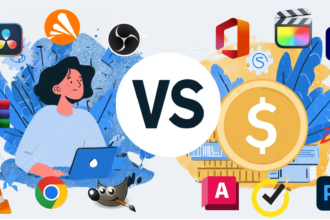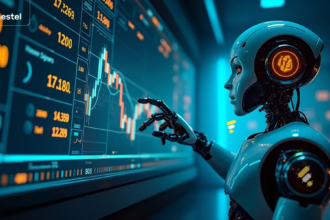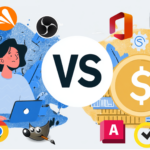In this article, we would talk about Artificial Intelligence Software; what it is, how it works, and why it matters in today’s society. It is simply computer programs that have been designed to imitate human cognitive abilities like learning, reasoning or problem-solving.
These smart machines use algorithms combined with extensive data sets in order to analyze information and make decisions without any human intervention which ultimately results into efficiency improvements across different sectors.
AI software has come quite far from virtual assistants such as Siri or Alexa all the way up till now where we see powerful machine learning models being used for recommendation engines powering self driving cars among many other things thus making this technology transformative and full of endless possibilities.
How does AI software work?
AI programs function through complex algorithms and data processing units that replicate human mental abilities and operate autonomously. AI software depends on large datasets as its backbone for learning and decision-making processes.
These datasets are analyzed by AI systems to identify patterns, correlations and insights using methods like neural networks, deep learning and machine learning.
The system is trained with the help of inputted training data so that it can adjust its algorithms repeatedly according to feedbacks which in turn helps in improving performance overtime.

In view of this fact about AI software’s ability to adaptively learn; from image recognition or natural language processing up till predictive analytics or self-driving cars it’s clear that there is virtually no limit what artificial intelligence can do.
Also known as trial error learning where a computer learns by doing things over again until they get them right – reinforcement learning is often used with other types too within AI systems which receive rewards upon achieving desired results while penalised for wrong decisions made during such processes.
Advanced algorithms coupled with large amounts of information have allowed companies such as Google revolutionize various industries by creating intelligent machines that can mimic some aspect of human reasoning thus making them more productive than ever before.
What does AI software do?
AI software performs a wide range of tasks in many different areas, with the goal of imitating and replacing human-like intelligence. Some popular functions for AI software are:
Analysis of Data and Forecasting: Large datasets can be examined by AI software to find patterns, correlations and trends that will enable data-driven decisions making and predictions by businesses.
Natural Language Processing (NLP): This is how AI software communicates with people. It allows language translation services, sentiment analysis tools or text summarization algorithms among other things.
Image & Video Recognition: With this capability, machines have the power to see; they can analyze images or videos to recognize objects, faces gestures even emotions thus used for applications like facial recognition systems, self-driving cars or medical imaging diagnosis aids.
Recommendation Systems: Sometimes referred to as “recommenders”, these algorithms learn from users’ past actions (preferably in form of explicit ratings) so as to suggest what they might like next in areas such as e-commerce platforms content streaming websites social networks etcetera.
Autonomous Systems: Autonomous vehicles (cars, drones…), can navigate through environments without human intervention thanks to Artificial Intelligence which also allows them make decisions and perform tasks on our behalfs too!
Virtual Assistants: These ones understand natural language voice commands; Siri does it on Apple devices while Google Assistant responds accordingly when you say “Hey Google” followed by whatever inquiry/task request plus Alexa being Amazon’s equivalent …you name it!
They provide information/assistance perform actions much like real-person assistant would do except they are powered by machine learning algorithms coupled with huge amounts data about us – their users- stored cloud servers somewhere far away from where we live/work/play today but still accessible whenever need arises right here now!!!
Healthcare Applications: The healthcare industry has always been a hotbed of innovations. AI software diagnoses diseases better than doctors do because it has access to millions more case studies not mention smarter too! Drug discovery personalized medicine plans health monitoring etcetera are all improved by artificial intelligence thus greatly enhancing patient care outcomes.
Fraud Detection: Banks need AI software in order to stay one-step ahead of fraudsters who keep devising new ways for stealing our money electronically or gaining unauthorized access into accounts online then siphoning funds off immediately without detection until much later when victims discover such activities among their financial transactions records if ever anyone bothers looking closely enough anyway?
Therefore, it needs continuous monitoring systems which can spot such patterns quickly and flag them as suspicious before any actual damage is caused
Gaming: Artificial Intelligence is used create intelligent opponents that are capable challenging players making gameplay more engaging exciting fun filled thrill seeking activity so that we never get tired playing games ever again!!!
Robotics: Robots perform tasks but sometimes lack skills required performing those tasks effectively on own thus may require some level human intervention control.
AI software fills this gap making it possible machines become smarter than humans or at least think faster and better too within shorter periods hence increasing productivity efficiencies across various industries manufacturing logistics healthcare among others.
Examples of popular AI software
TensorFlow: TensorFlow is a machine learning framework created by Google Brain that can be utilized for object recognition, natural language processing, and recommendation systems among other things.
PyTorch: PyTorch is an open source machine learning library developed by Facebook’s AI Research lab which has become popular because it’s easy to use while also being very flexible so it’s loved by both scientists who are just starting out as well as experienced developers who want more control over their models.
IBM Watson: IBM Watson is an AI powered suite of tools and services that includes capabilities like natural language processing (NLP), speech recognition, and machine learning (ML) used in various industries such as healthcare or finance; customer service representatives can also benefit from its skills too!
Amazon Web Services (AWS) AI Services: AWS provides several different artificial intelligence services including Rekognition which does image analysis on videos/images; Polly converts text into spoken words (text-to-speech); Lex enables developers build conversational interfaces into any applications mainly chatbots.
Microsoft Azure Cognitive Services: Azure offers many AI related functions through its cognitive cloud service named after Microsoft itself where computer vision APIs are provided with speech recognition capabilities combined along side language understanding features coupled together making decision-making possible enabling even non-AI developers add intelligence easily.
OpenAI GPT (Generative Pre-trained Transformer): OpenAI ‘s transformers-based language model called GPT-3 has the ability to produce human-like text when given some input prompting such as text generation, summarization or translation tasks
Salesforce Einstein: Salesforce CRM system embedded with artificial intelligence platform called Einstein that helps predict lead scores, provide personalized recommendations and automate sales/marketing processes thereby saving time & money spent on manual work like data entry.
Google Cloud AI Platform: Here, google cloud has various tools for AI such as ML models creation training deployment etc through its artificial intelligence platform commonly referred to us Google Cloud AI Platform
Apple Siri: Apple’s virtual assistant Siri uses artificial intelligence to understand natural language queries and perform tasks like setting reminders, sending texts or finding information.
Facebook Prophet: Facebook’s open-source time series prediction tool uses machine learning algorithms to create accurate forecasts in finance, supply chain management and other industries where forecasting is important.
Industrial and enterprise AI software use cases
Infusing the Artificial Intelligence (AI) that data-driven industries such as healthcare, manufacturing, transportation, security systems, government services and telecommunications use can be a game-changer.
AI also plays a significant role in enterprise network management which handles massive amounts of data traffic to ensure corporate data is secure.
Some industrial use cases for AI software are quality management; equipment maintenance and monitoring; digital twins (pairing of physical and virtual attributes of a product or structure); supply chain (warehouse management and logistics); demand forecasting and inventory management; use of robots in manufacturing; customer management.
It is through computing that machines can learn like humans do. Machine learning & deep learning improve processes, functions & operations for end-users’ satisfaction.
What are the benefits of AI software?
Increased Efficiency: Generalized AI software has the ability to automate repetitive tasks, which means that human capital is released and can be applied to more intricate and creative activities thereby enhancing overall productivity.
Better Customer Experience: Customer satisfaction can be improved if chatbots or virtual assistants powered by artificial intelligence are used for customer support since they can operate 24/7 and provide instant answers to questions.
Individualized Learning: AI-focused educational programs are capable of adjusting themselves depending on individual learners’ styles as well as pace hence delivering personalized learning encounters that cater for each student’s requirements.
Improved Healthcare Results: Diagnosis in medicine is supported by AI systems through analyzing patients’ data alongside images leading to early detection of diseases with accurate treatment plans eventually saving lives.
Enhanced Cyber Security: Organizations can protect their sensitive information from cyber threats such as hacking using this technology because it allows real-time detection and response through massive amounts of data analysis thereby preventing breaches.
Global Warming – Climate Change Impact Reductions Achieved Through Artificial Intelligence Software Applications Designed For Energy Optimization Within Industrial Manufacturing Sectors And Transportation Industry Resulting In Lower Greenhouse Gas Emissions (CO2) And Conservation Of The Environment At Large
Economic Development; Growth Of Economy Fostered By Innovation Driven Entrepreneurial Activities Propelled By Artificial Intelligence Software Applications Creating New Industries, Jobs As Well As Revenue Streams Generated Therein
Equality Before The Law; Justice Without Bias: Artificial Intelligence Can Help Reduce Discrimination During Decision Making Processes Thereby Ensuring Fairness Especially In Recruitment Practices, Loan Approvals Or Even Criminal Justice Proceedings Where Innocent People Might Be Convicted Unfairly Just Because Certain Factors Were Overlooked Due To Human Errors
Saving Lives During Emergencies – Disaster Response Improved Through Analysis Of Big Data Sets Coupled With Coordinated Rescue Operations Facilitated By AI Systems Which Provide Immediate Aid To Affected Populations Based On Real Time Information Gathered From Various Sources Like Social Media Platforms Among Others
Advancement In Scientific Discoveries; Breakthroughs Made Possible By Artificial Intelligence (AI) Software That Speed Up Processing And Analysis Of Large Data Volumes Leading To Achievements In Areas Such As Drug Development, Climate Change Modelling Or Even Space Exploration Etc.
Conclusion
To sum up, artificial intelligence (AI) software is a game-changing technology that is transforming lives in every way possible. With the ability to mimic human cognitive functions such as learning, reasoning and problem-solving, it allows machines to work on their own and take smart decisions.
AI touches many areas of the daily routine like virtual assistants or recommendation systems, but also includes self-driving cars or medical diagnoses; which improve speediness and accuracy beyond anything we have ever seen before this point.
The more progress we make with AI technologies now means there’s an even greater chance for breakthroughs later on down the line as well as finding new uses within different fields that were previously thought impossible. They must adopt ethical considerations alongside societal implications if we want to fully exploit the potential of this great tool for humanity while still caring about its welfare.














